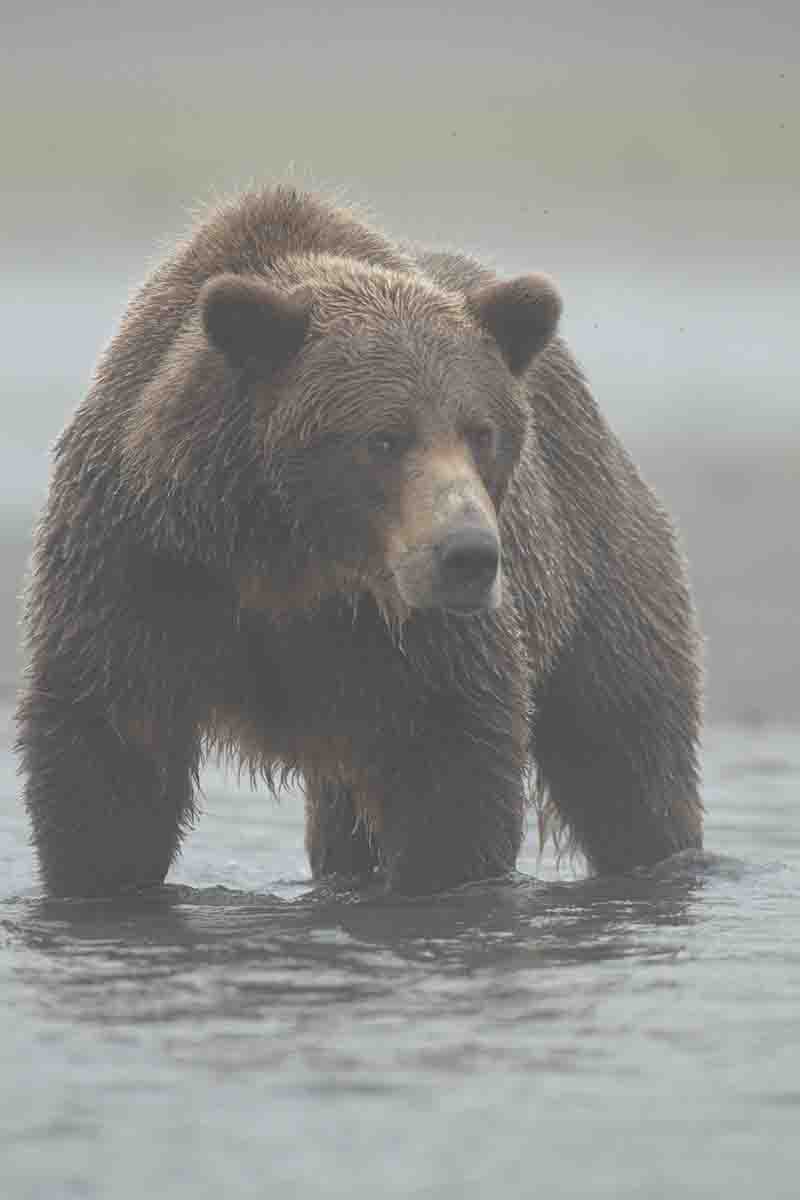
Background photo by Kenny Bahr.
Until the development of smokeless powder, the only means by which a hunter using black powder and soft, lead projectiles could be guaranteed adequate performance on the largest and most dangerous game was to increase the bore size, powder charge and weight of the projectile. Effective large-bore rifles of the era, especially those in Africa, were unbelievably massive by today’s standards; 12-bore rifles were considered small, and serious hunters toted 8-, 4- and even 2-bore rifles.
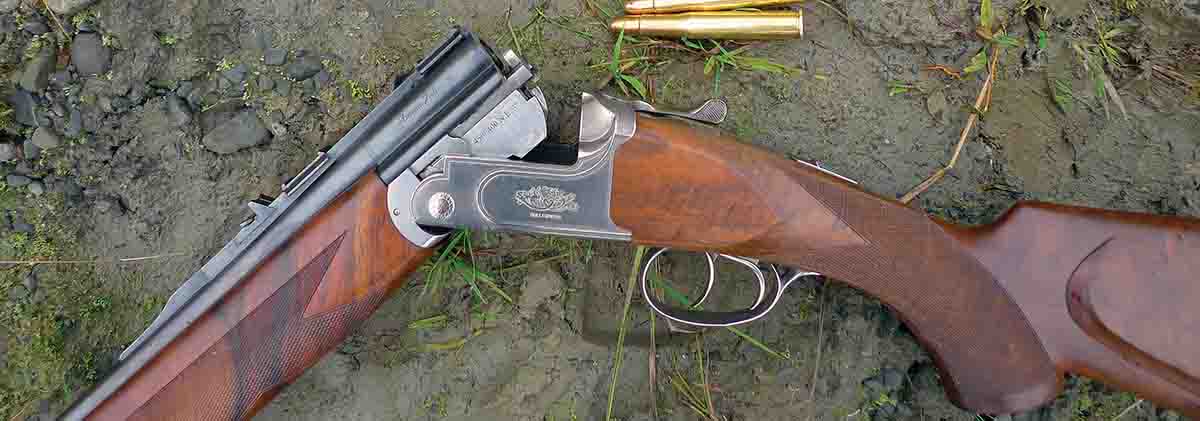
Heavy doubles, like this Zoli .450/.400, retain a small but faithful following in Alaska.
The concurrent development of smokeless powder and jacketed bullets in the late nineteenth century, however, changed the paradigm. Hunters discovered that long, jacketed, smallbore projectiles could be driven fast enough to reliably penetrate deep enough to reach the vitals on even the largest game. At the time the term “bore” referred to the number of round, lead balls of a certain diameter that could be produced by a pound of lead, but as actual “bore” rifles began to fade, the term was used simply as a means of arbitrarily grouping calibers.
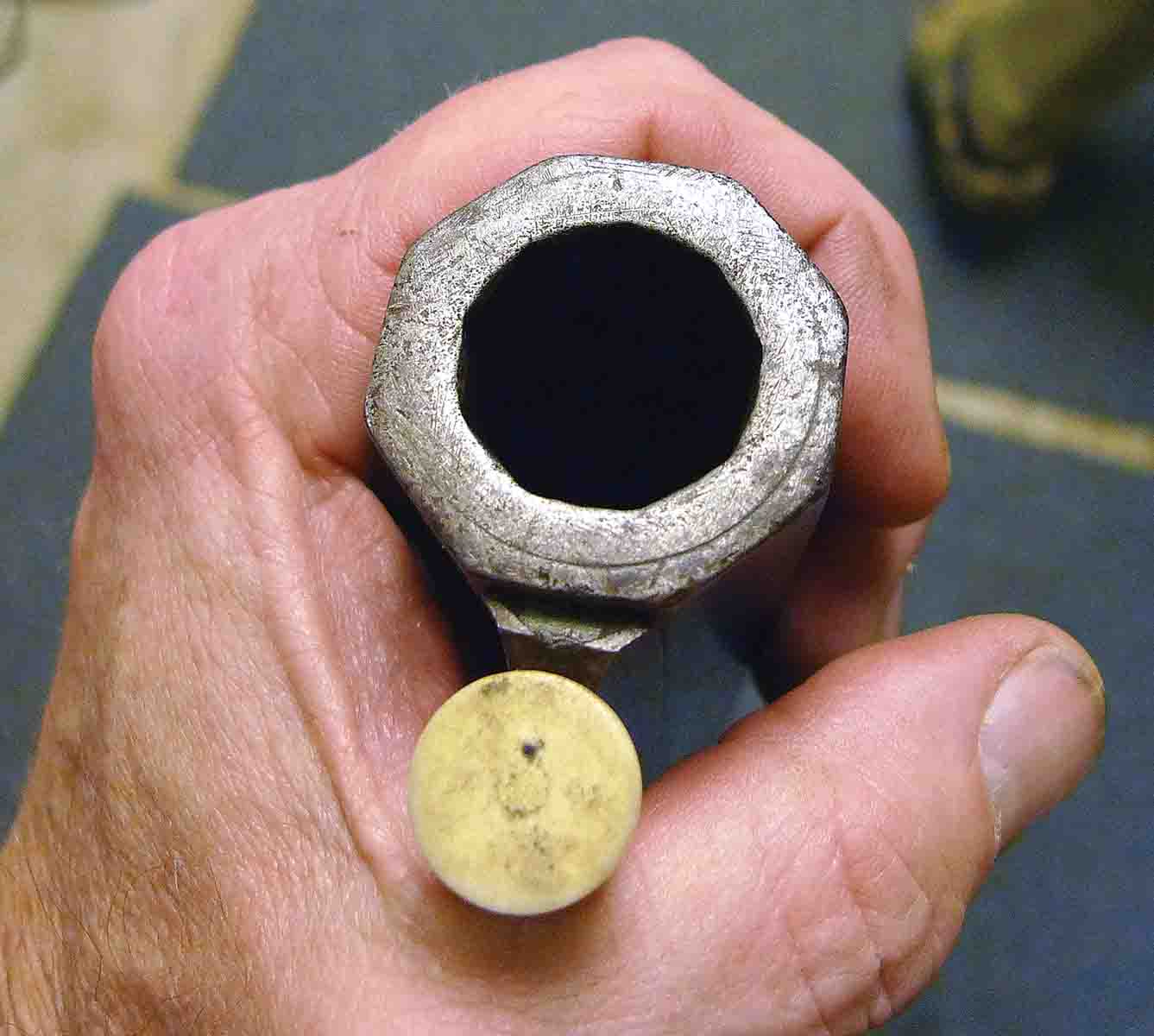
During the black-powder era, the only way to assure adequate performance on the largest dangerous game was to increase bore size, powder charge and bullet weight.
Notable hunters of the era, like W.D.M. Bell, F.C. Selous, Charles Sheldon, Vilhjalmur Stefansson and Andrew Stone, were quick to adopt the new technology and demonstrably proved the deadly effectiveness of smaller calibers. Adventurers and wilderness hunters were highly appreciative of the fact that rifles could be built slimmer and lighter, and with less recoil and flatter trajectories, game could be reliably taken at longer ranges.
Over a century later, what are now referred to as smallbore rifles dominate the market. With modern powders and stout, bonded-core and homogenous projectiles, bore size is increasingly becoming less and less important. A great many rural Alaskan hunters now think nothing of using their .223 Remingtons on deer, caribou and even moose. What we now consider the mid-bores, like the .243 Winchester, .25-06 Remington, 6.5x55 and .270 Winchester, can safely be pressed into service when hunting virtually any game in the state. One trapper I know, who lives in the foothills of the Brooks Range, has used a .22-250 Remington for the past 25 years on everything from wolves and caribou to moose and grizzly bears.
The most popular round in the state, both past and present, has been the .30-06. It was a ubiquitous favorite of generations of territorial hunters, guides and trappers. Territorial wardens and government hunters like Hosea Sarber and Jay Williams used theirs to sort out numerous problem brown and grizzly bears during the early portion of the century, and the legendary Kodiak brown bear guides Bill Pinnel and Morris Talifson recommend their bear hunters bring a .30-06 with 220-grain bullets. In 1952 Roy Lindsley used one when he killed the world’s record brown bear on Kodiak Island.
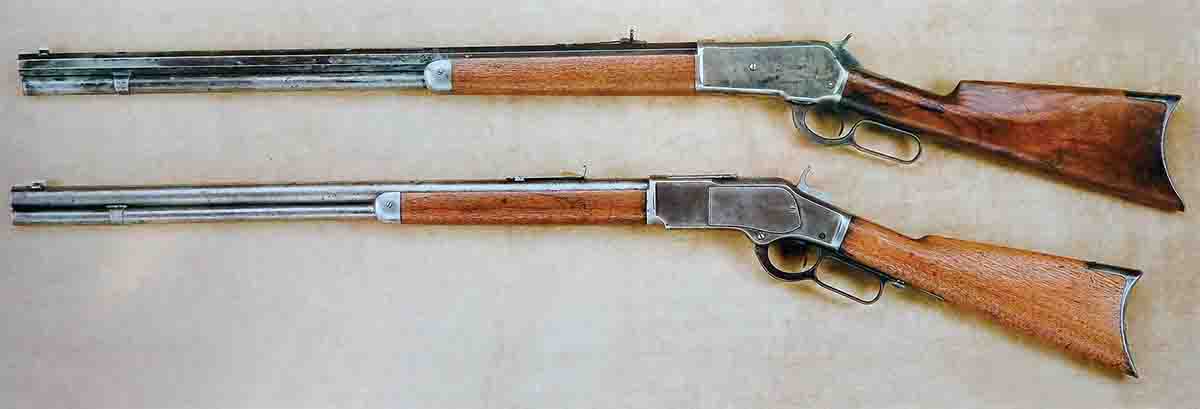
Until well after the advent of smokeless powder and the introduction of bolt-action rifles, large-bore Winchester rifles, like this 1886 (top) and 1873 (bottom), were the most popular rifles in Alaska.
The close of World War II brought an influx of hunters to the Alaskan territory who, after the sacrifices and deprivations of war, were desirous of new and modern goods. Although introduced at the beginning of the war, the Winchester Model 70 was the most modern rifle available and quickly earned a reputation as “the rifleman’s rifle.” Offered in a number of useful calibers, it was the large and seductively powerful .375 H&H that made it especially attractive to Alaskans. After years of tracking massive brown bears into thick cover with smaller bores, Kodiak guides like Pinnel and Talifson were quick to adopt the .375 H&H Model 70, and it was not long until it became the standard by which all other bear rifles were judged – at least all bolt-action rifles.
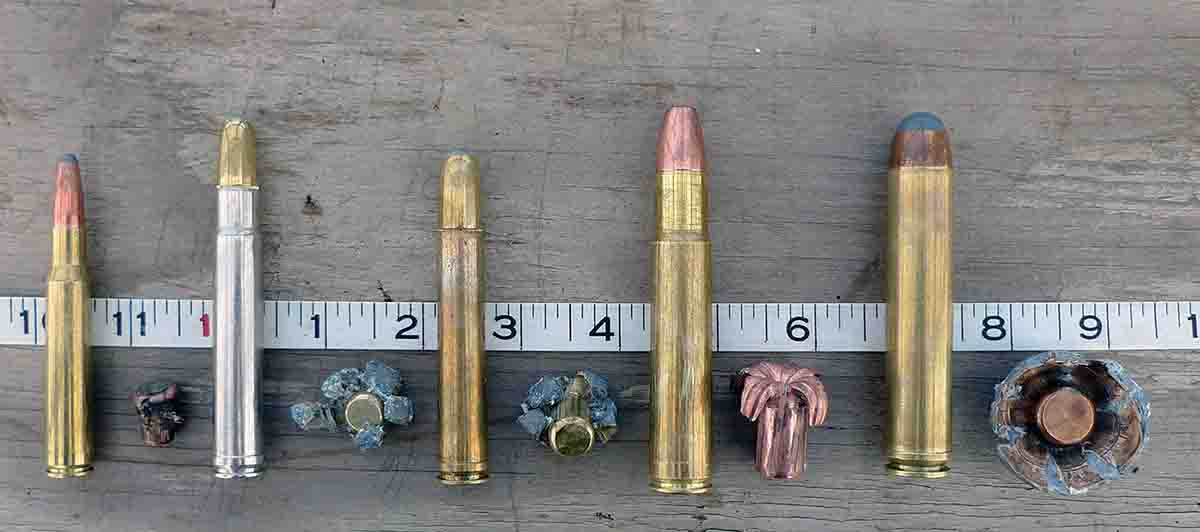
All these cartridges offer similar penetration and the ability to kill, but the immediate impact of the larger bores gives a more decisive edge (left to right): .30-06, Nosler 220-grain Partition; .416 Remington Magnum, Hornady 400-grain InterBond; .458 Winchester, Hornady 500-grain InterBond; .505 Gibbs, Barnes 570-grain TSX; and .600 Overkill, 900-grain Woodleigh.
Over on the nearby Kenai Peninsula, Harold Johnson, a gun builder from Cooper Landing, was also looking for a little more bear stopping power than he was currently getting in his old Winchester Model 86 .45-70. After corresponding with gun writer Elmer Keith, he decided to neck up and expand the .348 Winchester case to .45 caliber. Bill Fuller, a machinist friend, ground him a reamer, and barrel maker John Buhmiller sent him a barrel. Harold christened his round the .450 Alaskan and settled on a load of 51.5 grains of IMR-4198 behind a .032-inch copper jacketed, 400-grain Barnes bullet. Although never built in any large numbers, the .450 Alaskan earned a solid reputation as a first-rate bear stopper and developed a small but vocal cult following. Reloading data, obtained from the first edition of Wolfe Publishing’s
Big Bore Rifles and Cartridges shows that while it is possible to reach 2,100 fps with 400-grain bullets, 2,000 fps is a more realistic endeavor.
Like most avid rifle loonies, Harold continued experimenting with large bores, and when a client showed up one day with a surplus .50 BMG barrel, his wheels immediately began turning. He cut and turned it down to fit one of his original .50-110 Model 86 Winchesters. At that time Alaska was flooded with military surplus items, and Harold had no trouble obtaining 750-grain, boat-tail, .50-caliber machine gun bullets that he chopped off behind the ogive. When reversed, they resulted in a tough, deep-penetrating and slick-feeding, 450-grain truncated cone bullet, and the resultant .50 Alaskan became Harold’s favorite bear stopper.
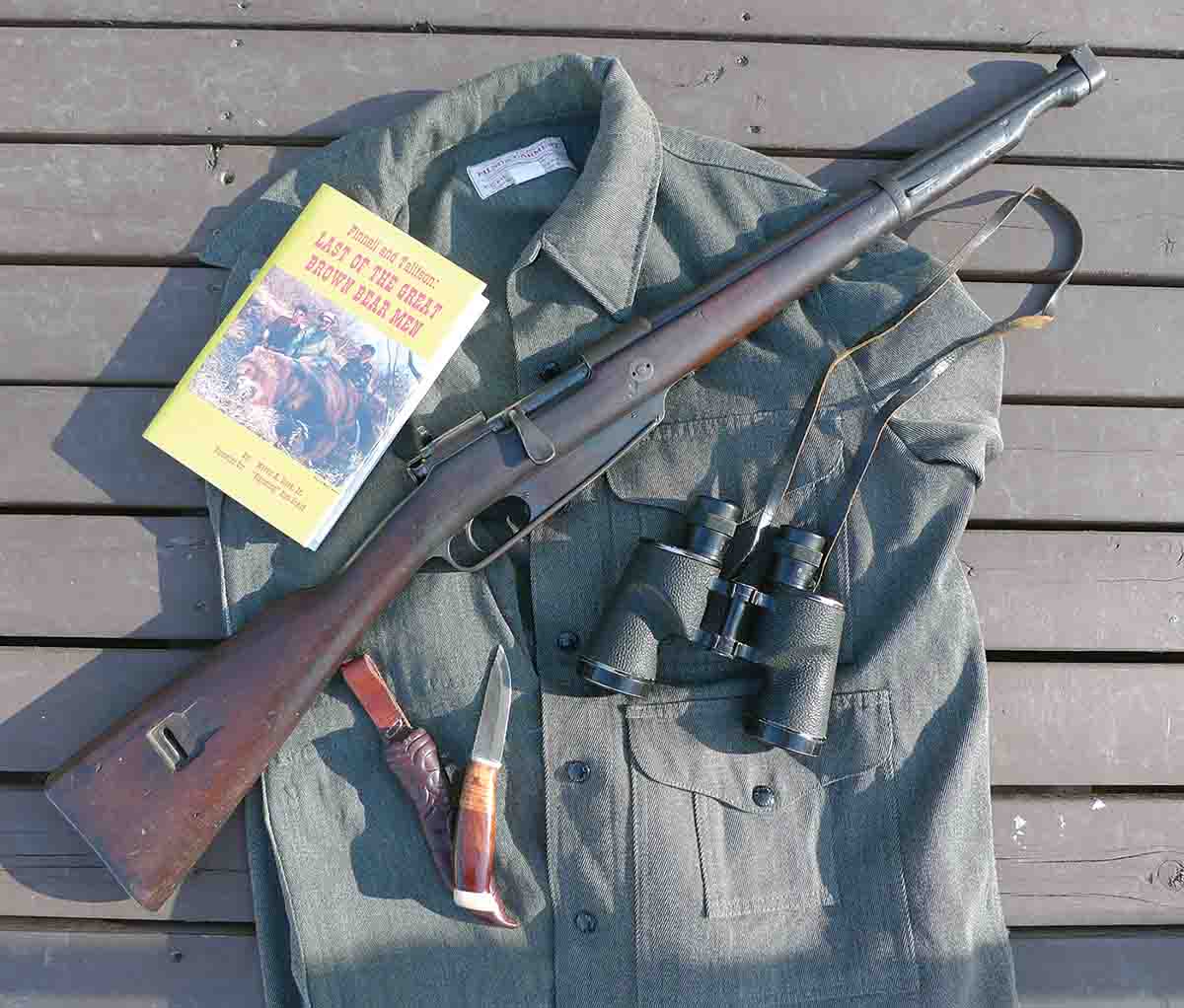
The famous Kodiak guide Bill Pinnel’s surplus M-88 commission 8mm rifle that he used on Kodiak bears until re- placing the M-88 with a Winchester Model 70 .375 H&H.
Due in no small part to the state’s healthy population of grizzlies and brown bears, large-bore lever actions remain a popular item in our 49th state. With stoutly loaded Buffalo Bore, Cor-Bon or Grizzly ammunition, the Winchester/Brown- ing Model 86 and Marlin Model 95 .45-70 guide rifles are the modern equivalent of Harold’s .450 Alaskan rifles. If more power and punch are desired, the .475 Turnbull in Browning and Winchester Model 86 and Model 71 rifles, modified by Doug Turnbull, offer the same serious big-bore performance as did Harold’s .500.
By 1958, a year before Alaska reached statehood, Winchester officially acknowledged the lure of powerfully large, big-bore rifles in the last frontier. The company introduced an entirely new, belted .338 Winchester Magnum round in a new “Alaskan” version of the Model 70. Although history has proven it a sound concept, the .375 H&H had more than a decade’s head start, and initial sales of the .338 were slow. Demand for the new magnum round remained steady however, and as reports from the field trickled in, the .338 Winchester eventually earned its place as the singularly most popular round among guides and those who routinely roamed brown bear country.
Today, with widespread Internet access and mega sporting goods stores like Cabela’s, Bass Pro and Sportsman’s Warehouse, Alaskans have the same access to firearms as anywhere else in the lower 48 states. It is not uncommon to find a teacher in Sitka shooting a .338 Lapua Magnum, a guide in Wasilla with a .460 Weatherby Magnum or a trapper in Two Rivers with a .358 Norma Magnum. Although the .30-06 manages to maintain a tenuous grasp as the most popular cartridge in the state, the .223 Remington and the various .300s are close behind in terms of sales. Although the .338 has surpassed the .375 H&H in overall popularity, the .375 Ruger appears to be rapidly supplanting both as the guide’s choice. Its combination of value, portability and reliability, coupled with flat trajectory and raw power is difficult to beat.
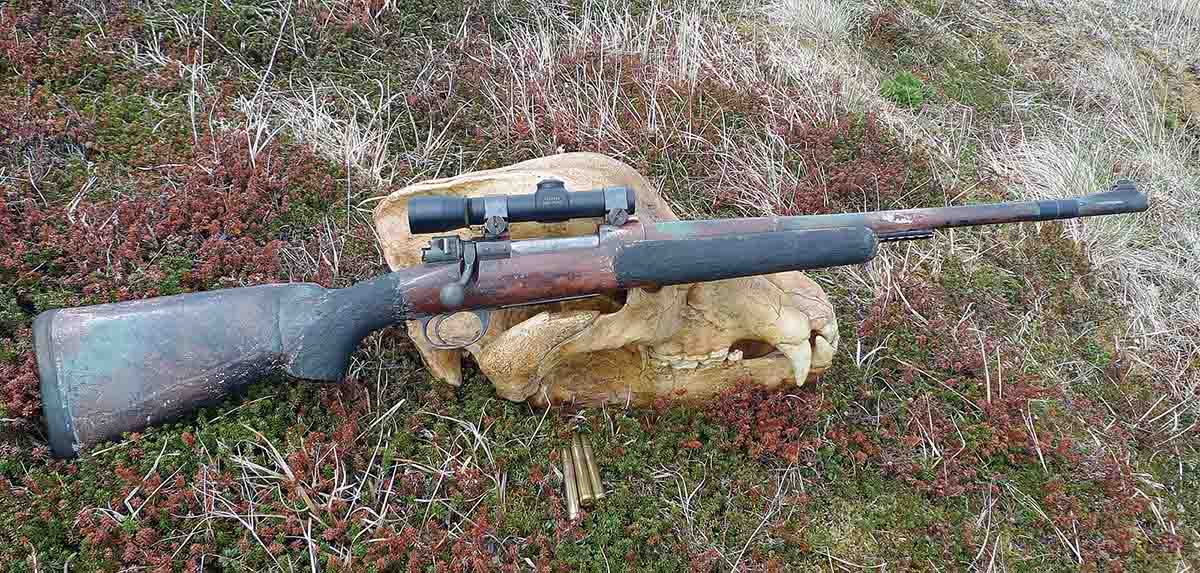
Phil’s favorite brown bear rifle for the past three decades is a .458 Winchester Magnum.
There are still a few of us graybeards left in the state, however, who are unwilling to sacrifice the marginal advantage offered by our .416s and .458s. When dealing with dangerous game as large, impressively quick and intelligent as brown bears, any advantage can mean the difference between hiring a taxidermist or a surgeon. As anyone who has experience in mortal combat or even a dust-up on the school yard can tell you, stunning or dropping your adversary a fraction of a second quicker or keeping them down a second longer can be a tremendous advantage. It is the best I can offer to describe the elusive big-bore “knockdown power” that hunters, soldiers and ballisticians have striven so long to quantify, and the reason for the continual fascination of powerful, large-bore rifles.





.jpg)



